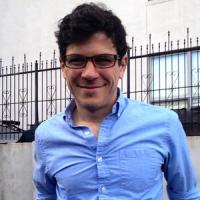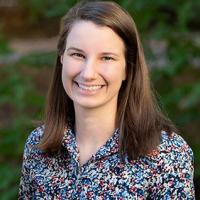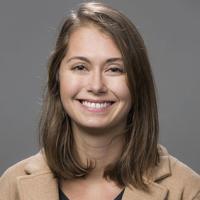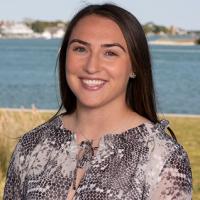Plastic Pollution Working Group Members
Faculty

Lisa Campbell
Dr. Campbell is broadly interested in oceans governance and the role of state and non-state actors in negotiating ocean governance priorities. With a group of collaborators, she has been tracking the emerging agenda for global oceans governance over the last decade, through organizations like the Convention and Biological Diversity and the UN Sustainable Development Commission. In this context, Dr. Campbell is interested in how plastic pollution emerged and rose to the top of the list of marine conservation concerns among some NGOs and the public, the coalitions that worked to promote it as a priority and the funders who rallied to support, and the science that informs it.

Charlotte Clark

Liz DeMattia
I am an ecologist at the Nicholas School of the Environment who is interested in the intersection of science and community. I am currently working on issues of plastic pollution education from a marine debris perspective and a stormwater/microplastic perspective. I have written curricula regarding marine debris (elementary) and community science and microplastics (high school) and collaborate with researchers at the EE lab of NCSU to study the role of intergenerational learning in changing perspectives on plastic pollution.
Kids’ Presentations Sway Local Leaders’ and Voters’ Attitudes on Ocean Plastics Pollution (article)
Q&A: MEM Students Discuss Why They Got Involved in STEM Education Outreach (article)
Duke Marine Lab Science Outreach With Boys & Girls Club (YouTube video)
Duke Marine Lab Community Science Program on Twitter: ![]() dumlcommunity
dumlcommunity

Meagan Dunphy-Daly
Dr. Dunphy-Daly’s research focuses on the role of policy and technology in reducing marine plastic pollution. She is interested in how regulations for other pollutants have led to improved technology and how we can apply these frameworks to the plastic pollution pandemic. Dr. Dunphy-Daly co-lead a Bass Connections team on the bioremediation of plastic pollution to conserve marine biodiversity, and she works to engage students in research aimed at ways to reduce the human impact on our marine environment.

Evan Hepler-Smith
Evan Hepler-Smith is a historian of modern science and technology, specializing in the global history of chemistry, computing and information technology, and chemical dimensions of environmental health, regulation, and justice. His plastics-related research includes work on the naming and classification of polymers and microplastics, as well as on the "industrial metabolism" of plastics (i.e., production, distribution, use, disposal, environmental fate and transport). He teaches History 235, "Drugs, Chemicals and Health: Following substances through economies, environments, and bodies."

Nancy Lauer
Dr. Nancy Lauer is a Lecturing Fellow and Staff Scientist with the Duke Environmental Law and Policy Clinic. Dr. Lauer works with the City of Durham, riverkeepers, and the local non-profits on measures to reduce plastic waste and plastic pollution through stormwater controls and source reduction. Much of her research focuses on developing methods to collect data on plastic pollution and using that data to inform effective plastic policies.

Michelle Nowlin
Michelle’s research is focused on understanding the sources and impacts of plastic debris on aquatic and marine environments and human health, and developing policies and regulatory mechanisms to address and reduce those impacts. Much of her client-based work focuses on mechanisms for upstream communities that reduce waste at the source.

John Virdin
Amy Pickle, J.D. and Dr. John Virdin are interested in studying how governments have or can design effective public policy responses to the problem, including:
- Empirical analysis of public policy responses in different contexts
- Global monitoring and tracking of public policy responses and evidence for their effects
- Translating public policy responses into projected reductions in mismanaged plastic waste
Additionally, they are interested in the role that large corporations can play in governance of plastics use, including:
- Empirical analysis of large corporate responses to the plastic pollution problem and evidence for effects
- How large corporations are organizing to address the problem
Staff

Miranda Bernard
Miranda Bernard (she/her) is a marine social scientist who is currently a postdoc in the Ocean Synthesis Lab. She is interested in studying the dynamics between conservation interventions and community members. Her prior work has focused on community perceptions, the role of community engagement in marine protected area management, plastic pollution interventions from the local to a global scale, and the impacts of fisheries certifications on ecosystem services.

Zoie Diana
Zoie Diana, Ph.D., is an interdisciplinary scholar and sustainability scientist interested in environmental risks posed by marine plastic pollution and societal responses to this global conservation issue. Zoie recently earned her Ph.D. in multisector mitigation of plastic pollution in the Marine Science and Conservation Division and Integrated Toxicology and Environmental Health Program at Duke University. During this time, she conducted research with colleagues at the Nicholas Institute for Energy, Environment & Sustainability and the Environmental Law and Policy Clinic. She is a Liber Ero Postdoctoral Fellow at the University of Toronto with partners at Ocean Conservancy and the Ontario Ministry of the Environment. Before earning her Ph.D., Zoie earned her Master of Coastal Environmental Management from Duke University and her Bachelor of Science with a double major in Environmental Science and Philosophy from Allegheny College. Her research has been published in journals like One Earth, Environment International, and Environmental Science & Policy and featured in media outlets such as The Hill, The Guardian, and Popular Science.
Alums

Anne-Elisabeth Baker
Anne-Elisabeth’s research interests are focused around design and policy interventions to reduce plastic waste. Her background in industrial design has informed her interest in material circularity and end-of-life. She hopes to continue to explore the intersections of design, policy, and environmental justice.

Kim Corcoran
My research primarily focuses on marine mammal and marine protected species conservation and currently work in a regulatory role protecting these species. While at Duke, I participated in the ‘Bioremediating Plastic Pollution to Conserve Marine Biodiversity’ Bass Connections team, working on a paper that looks at how technology-forcing policy mechanisms could be used to reduce plastic pollution.

Niki E. Lisi
As a graduate student in Duke's Coastal Environmental Management program, Niki joined Duke Bass Connections as a member of the Bioremediation of Plastic Pollution to Conserve Marine Biodiversity project team. While working with this group, Niki primarily focused on examining how technology-forcing mechanisms within the Clean Air Act and Clean Water Act were used to decrease historical pollutants.This work, in combination with other strategic reviews, will be used to inform policy recommendations for reducing plastic pollution. After graduating from Duke in 2021, Niki joined the National Oceanic and Atmospheric Association Fisheries Office of Protected Resources, where she currently works as their North Atlantic right whale Coordinator. Although Niki's work revolves around right whales and policy to reduce the threat of vessel strikes and entanglements to the species, she remains interested in plastic pollution and the Plastic Pollution Working Group. She is particularly interested in plastic marine debris, and derelict fishing gear and their effects on marine protected species.

Jenna Seagle
Jenna is the Program Manager of the Plastic Pollution Working Group. In this role, she coordinates working group research and outreach activities. She is researching pathways towards global sustainability for plastic pollution. She is also co-lead of Duke Restore’s Coral Team. Jenna is interested in the intersection of these two positions looking at the effects of microplastics on corals. Her prior, undergraduate research has focused on the intersection of international policy and marine plastic pollution.
